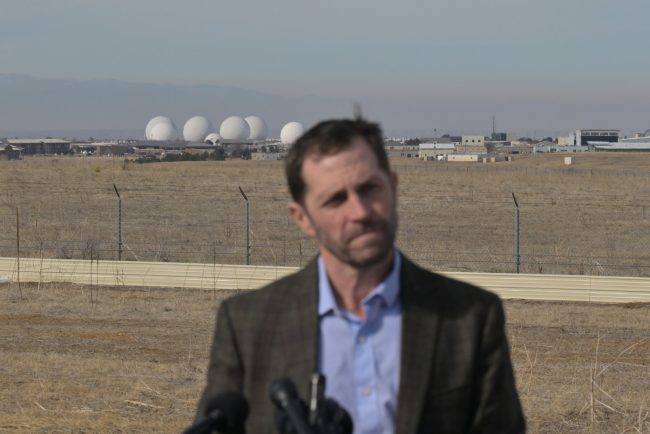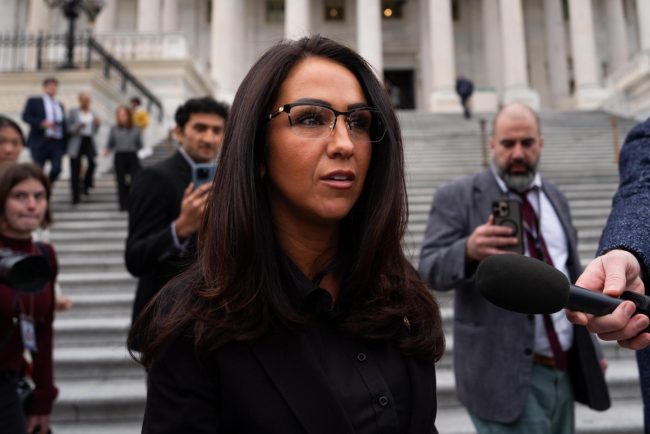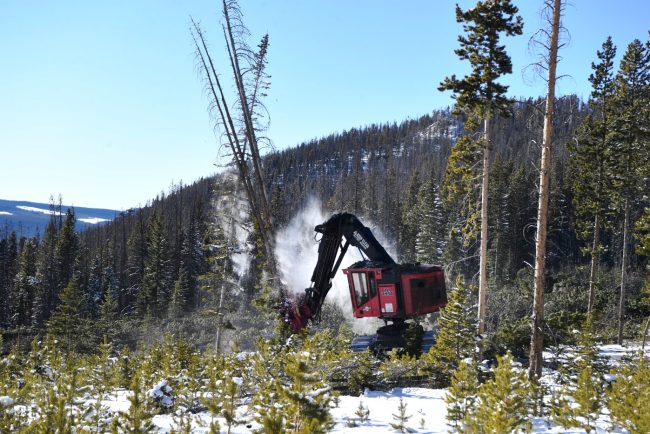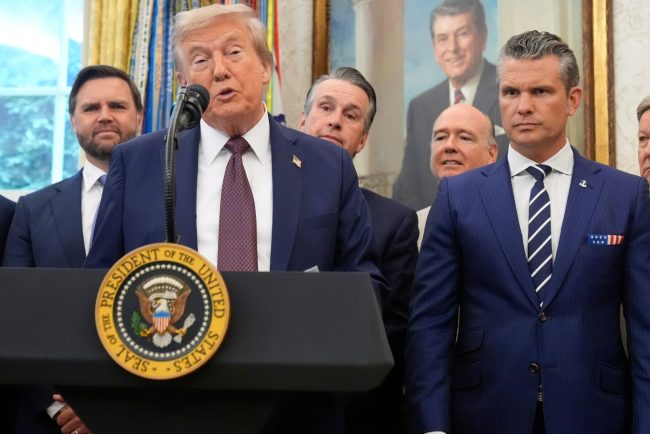
Trump’s response to Rep. Crow’s video was completely unhinged (Opinion)
President Donald Trump just threatened an elected Colorado representative with arrest, a trial, and execution. The response was unhinged. Trump said in a social media post that Crow and others were guilty of “SEDITIOUS BEHAVIOR, punishable by DEATH.” This is only further evidence that Trump […]
Columnists
Colorado’s Lauren Boebert stands up for Epstein’s victims (Letters)
Standing up for the Epstein victims and decency Re: “Release the Epstein files, and let’s get rid of the ‘Epstein class’,” Nov. 19 commentary Anita Chabria makes a good point about the oligarchy, their arrogance, and not-so-innocent interaction with girls. It is time to out […]
Letters
They fled the Taliban, legally entered the U.S. and now Trump is detaining them (Opinion)
Music was the topic in our English practice session. “What is music like in Afghanistan?” one of us asked. “Music not allowed,” said one of the women. “Taliban,” said another pantomiming the bucking recoil of a machine gun. “Hurt you.” If these women are ever […]
Columnists


Krista Kafer: Colorado, don’t back down from Trump’s threats
She fled. It was the middle of the night. Her boyfriend had hit her hard enough to blacken her eye. Fearful of going to the police because she was in the country illegally, she went to her workplace instead. Though closed for business, the security […]
ColumnistsShe fled. It was the middle of the night. Her boyfriend had hit her hard enough to blacken her eye. Fearful of going to the police because she was in the country illegally, she went to her workplace instead. Though closed for business, the security guard was on duty, she reasoned, would protect her from another blow. Though my friend, a manager at the company, encouraged the young woman to go to the police, she feared they would tip off federal immigration enforcement. The crime went unreported.
This is the kind of situation that Colorado laws are designed to prevent. By limiting communication between state and local law enforcement and Immigration and Customs Enforcement (ICE), victims of crime, regardless of legal status, can feel safe approaching local police to report crimes and receive protection. These laws do not stop federal agents from enforcing federal immigration laws, they ensure that our police officers have the trust of the public as they enforce state and local laws.
Unfortunately, the Trump administration is trying to bully Colorado into repealing these laws with threats and litigation. These efforts, if successful, would cripple our state’s autonomy under the Constitution to govern law and order.
The Department of Justice’s most recent intimidation tactic, a letter sent last month to Colorado and the city of Denver and other jurisdictions around the country, demanded that the state and city repeal their so-called “sanctuary” laws or face criminal charges. The so-called sanctuary laws–so-called because “sanctuary” is nowhere defined in law—refer to legislation passed by the Colorado General Assembly over the past six years limiting communication and cooperation between state and local law enforcement and ICE.
For example, Colorado laws state that local law enforcement cannot arrest someone based on whether he or she is here illegally or share immigration status information with federal authorities unless a judge has issued a warrant in a federal criminal investigation.
Additionally, police cannot hold individuals in jail past their release time so they can be picked up by ICE. However, local authorities can still respond to ICE requests to provide information on when inmates will be released so ICE agents can be on hand.
The threat to prosecute so-called sanctuary jurisdictions comes after the administration’s failed attempts to starve and sue them into submission. The courts quashed the administration’s efforts to withhold funding from noncompliant jurisdictions as a violation of the Constitution’s Tenth Amendment and other provisions.
The Tenth Amendment states, “The powers not delegated to the United States by the Constitution, nor prohibited by it to the States, are reserved to the States respectively, or to the people.” Policing, a government responsibility nowhere delegated to the federal government, is clearly a state and local prerogative.
For similar reasons, the Trump administration’s suit against the state of Colorado and city of Denver, lodged in May, is also unlikely to succeed. A federal judge dismissed a similar suit against Illinois, Chicago and Cook County reasoning that the Tenth Amendment protects these jurisdictions’ “decision to not participate in enforcing civil immigration law.”
Given past precedents, the Supreme Court will uphold these lower court rulings and back states and localities against the Trump Administration. Back in 1997, when the Clinton administration and Congress tried to commandeer local law enforcement into enforcing the Brady Handgun Violence Prevention Act, the Supreme Court ruled in Printz v United States that thanks to the Tenth Amendment, the federal government cannot “command the States’ officers, or those of their political subdivisions, to administer or enforce a federal regulatory program.”
The application to this situation couldn’t be clearer. The Trump administration’s efforts to coerce states and localities by carrot or cudgel to repeal duly enacted laws will come to naught, an expensive taxpayer-funded naught, but naught nonetheless.
In the meantime, state and municipal elected officials are to be commended for not backing down.
Krista Kafer is a Sunday Denver Post columnist.
Sign up for Sound Off to get a weekly roundup of our columns, editorials and more.
To send a letter to the editor about this article, submit online or check out our guidelines for how to submit by email or mail.
Blame for layoffs lands on Johnston (Letters)
Blame for layoffs lands on Johnston Re: “Denver’s layoffs hurt 171 families, not just the Gilmore’s,” Aug. 31 editorial The editorial attacked the wrong elected official. We ought to praise Councilwoman Stacie Gilmore for serving as the canary in the coal mine for the mayor’s […]
LettersBlame for layoffs lands on Johnston
Re: “Denver’s layoffs hurt 171 families, not just the Gilmore’s,” Aug. 31 editorial
The editorial attacked the wrong elected official. We ought to praise Councilwoman Stacie Gilmore for serving as the canary in the coal mine for the mayor’s bizarre behavior. She has long asked for facts and figures, while many of us incorrectly presumed the mayor would do the right thing for our city.
Gilmore has defended her constituents and the city with passion. And her husband is her constituent. Do we want someone representing us who would not stand up for their own constituents for wrongly being targeted by a public employer? I certainly do not.
Mayor Mike Johnston’s financing and budgeting has looked like the recent accident on I-25 where a piece of construction equipment fell off the back of a truck. He just does stuff without any transparency and then tells everyone how great and transparent his work product is, without evidence.
For example, a hotel purchased with taxpayer dollars under the Hancock administration in 2021 for homelessness resolution sits vacant, while homelessness and evictions have gone up drastically. The mayor called Gilmore’s claims “factually inaccurate” but then proceeded to illuminate precisely zero facts about how that was so.
Meanwhile, the mayor continues a series of backroom meetings without telling constituents or councilmembers what he plans to do.
I have personally witnessed Gilmore helping laid-off workers and their families. I hope taxpayers ask the mayor more pointed questions about his budget actions. Thank you to Councilwoman Gilmore and her colleagues who have stood up for their constituents.
Josh Rosenblum, Denver
After spending millions of dollars on benefits for “undocumented” immigrants, it’s telling that Gov. Jared Polis and Mayor Mike Johnston both find themselves in major budget shortfalls. The mayor has announced mass layoffs for city workers and the governor has begun implementing huge cuts to state services. It seems the only sacrosanct budgets are those that support non-citizens, proving once again that Polis and Johnston are for “they/them” (illegals) instead of “we/us” (legal US citizens).
Mark Boger, Fruita
Johnston was right to de-emphasize tenure
Re: “Denver lays off 171, cuts positions,” Aug. 19 news story
Regarding city layoffs. In business, I’ve experienced this on both sides in Fortune 500 companies and the way Mayor Mike Johnston de-emphasized tenure and focused on performance is absolutely the right thing to do to increase the efficiency of our local government.
The city staffing has also ballooned disproportionately over the last few years. I can’t believe all the belly-aching going on. Clearly, these people haven’t had experience in any competitive business setting. Kudos to Mayor Johnston for taking these courageous steps.
Don Ku, Denver
U.S. strike on vessel shows Trump’s corruption
Re: “Trump says strike on vessel targeted Tren de Aragua gang,” Sept. 3 news story
Trump’s order to execute the suspected drug smugglers in international waters shows exactly how dangerous this maniac is to our country and world.
He perceives himself to be above the law. He is supported in that fantasy by a corrupt Supreme Court, puppets and lackeys in the administration, and a Republican Congress full of cowards.
And now even the military does not refuse illegal orders! The dictator is here, now!
Jim Blugerman, Georgetown
Never have I ever seen immediate, predictable accusations, like “Republicans aren’t racist, that’s prejudice.” And, “liberals like you are the problem.” People seeking love don’t act like that. Bots do. Like the “vegan couple” I matched with a month ago, who abruptly asked: “Why is exploiting animals an immoral position you are so willing to accept?” This was after an otherwise normal dialogue.
Why write a letter about either of these interactions? Because it’s possible people were on the other side of the app, it’s equally plausible that it was a bot.
AI is making it easier for political operatives to push and pull us based on the psychographic data we’ve fed to Meta et al for decades. It’s important for us to be aware that we may or may not be interacting with real people. There are well-funded political machines at play in our political landscape. So, as we put ourselves out there looking for love, beware of bots.
Nate Craig, Boulder
” ]
Sign up for Sound Off to get a weekly roundup of our columns, editorials and more.
To send a letter to the editor about this article, submit online or check out our guidelines for how to submit by email or mail.

The price of Buffs football glory just got a lot more expensive (Editorial)
College amateur hour is dead. Long live the revenue-sharing arms race. Starting this fiscal year, colleges and universities are now able to directly pay their student athletes thanks to the so-called House settlement. The multibillion-dollar settlement ended three antitrust lawsuits against the NCAA that claimed […]
OpinionCollege amateur hour is dead. Long live the revenue-sharing arms race.
Starting this fiscal year, colleges and universities are now able to directly pay their student athletes thanks to the so-called House settlement. The multibillion-dollar settlement ended three antitrust lawsuits against the NCAA that claimed the organization was limiting the earning power of college athletes.
Along with the 2021 name, image and likeness changes that allowed players to be compensated by third parties for their personal brand, the House settlement is helping to address the historic exploitation of the talents of college athletes. CU Boulder made nearly $35 million in football ticket sales during the 2024 season — that’s not possible without these student-athletes.
But for all the positives that NIL and the House settlement are bringing to college athletics, they have also opened a financial can of worms. Running an athletics department was already an expensive endeavor; now, if schools are keen to compete, they must rustle up tens of millions of dollars to pay their players.
In other words, the cost of glory just got a lot more expensive.
So, as we hurtle into this new frontier, CU Boulder must refrain from throwing caution to the wind. There may be money to be made and bowl games to win, but our state’s flagship university must remember that, first and foremost, its mission is one of education.
Schools that opted into the House settlement’s revenue sharing can now spend up to $20.5 million paying athletes this year. That figure will increase annually by 4% until it hits $33 million in 2035.
That $20.5 million cap is designed to prevent wild overspending by the richest schools in order to maintain the semblance of fair play. But there is no obligation for a school to spend that much paying its players. For its part, Colorado State University says it is going to ramp up to the cap. CU, though, is planning on going all in.
For an athletic department that has run a deficit for five of the last seven years, that is a big ask.
It is worth pausing here for a moment to make clear that CU’s revenue sharing will include all of its sports. The school’s revenue-sharing equation will align with how much revenue a given sport generates. As such, football is likely to get 77% of all revenue sharing money, with basketball claiming another 11%.
So, while CU will be paying athletes from all sports, it is worth focusing specifically on the lucrative — but costly — football program.
CU made its ambitions clear when it hired Deion “Prime” Sanders. His name brought record donations ($35 million in FY 2025) and a national spotlight. ESPN came to Boulder and the Buffs started playing in primetime games. That money and attention made it possible to make statement recruitments and bring some of the best players to Colorado, including Heisman Trophy winner Travis Hunter.
But for a school striving to level up, this is a precarious balancing act.
Right now, CU needs Prime to keep the money flowing and the recruits coming. And it needs star recruits who can help win games to keep Prime and the money. If CU can’t compete financially, the players could stop signing. If the best players stop signing or stop winning, Prime — and the spotlight he brings — could leave. (He will, of course, inevitably leave at some point, no matter how successful CU becomes.)
Keeping all these plates spinning comes at a cost. Despite record donations and ticket sales, the CU athletic department required direct institutional support of $54.9 million over the last two years. Between 2017 and 2022, the department required just $49.3 million. The Prime Effect, for all the good it has done for CU, has been extremely expensive.
The hope, of course, is that CU’s drastic increase in investment in the department will help the school level up so that it can compete with the best schools in the country — and make money.
But for now, the House settlement has only added to the cost of staying competitive.
For its part, the school says it is going to get creative to cover its new $20.5 million expenditure to pay athletes.
“(That $20.5 million) will come from the different things that we do,” CU athletic director Rick George told the Denver Post, “like concert revenue, our multimedia rights partner, our conference distributions, our donors that support our program.”
Astroturf was installed at Folsom Field to make it easier to have concerts and events there. The school’s student athletic fee for undergraduates was tripled to $90. And, of course, there will be a push for more donations.
What CU won’t do, according to George, is cut any sports. Nor will ticket prices see any “big increases.”
Whether or not the department will be able to cover this new expenditure without direct institutional support will likely tell us a lot about how CU’s journey into this new financial frontier will go.
Naturally, we hope to see the school be able to fairly compensate its athletes, compete on the big stage, and become financially self-sustaining. Watching Buffs football compete these past two years has been a welcome reprieve from years spent in the wilderness of mediocrity. A winning team that can keep the limelight on CU and raise the school’s profile is ideal for everyone. Not only can success on the football field provide financial incentives, it can also drive school pride and give prospective students a little extra incentive to enroll.
But the price of winning can be steep. And CU must approach this new frontier with reasonable expectations and responsible decision-making. Direct institutional support of athletics must have a limit — and CU must approach all decisions with its mission as an educational institution at the fore.
We want to see the Buffs succeed as much as any fan. But more important than that, we want to see CU students succeed. That goal must remain top of mind, no matter how fierce the competition gets on the field.
— Gary Garrison for the Editorial Board

Trump threatens pretrial fairness in a push that only protects wealthy bondsmen (Opinion)
This week, President Donald Trump took aim at Illinois’ Pretrial Fairness Act, which ended cash bail in the state in 2023. Trump pledged to repeal the Act and deploy the national guard as an occupying police force in Chicago. It’s no surprise that Trump used […]
ColumnistsThis week, President Donald Trump took aim at Illinois’ Pretrial Fairness Act, which ended cash bail in the state in 2023. Trump pledged to repeal the Act and deploy the national guard as an occupying police force in Chicago.
It’s no surprise that Trump used false claims and fearmongering to vilify the thoughtful pretrial reform law in Illinois. After all, the early success of this reform threatens a key deception Trump relies on for coalescing his power – that more people in cages will make us safer.
For some context, most people jailed in the United States, including in Colorado, are accused and not convicted of a crime and are in jail only because they cannot pay the money bail required for their freedom. Cash bail is a poverty test with dire consequences: poor people remain jailed pretrial, often losing their jobs, their housing, custody of children, and connections with services. People with money buy their freedom, keep their jobs and housing, take care of their families and see far better case outcomes.
Our cash bail system, where wealth determines freedom, is a scourge on the moral fabric of this country and this state. It does nothing to increase community safety, and it further destabilizes and impoverishes our most vulnerable communities.
But in Illinois, because of the Pretrial Fairness Act, money no longer determines pretrial freedom — judges now decide about pretrial release or detention through transparent hearings. While facts may not matter to the Trump administration, Coloradans should know Illinois has ended cash bail with strong results: jail populations are down, crime is down, court appearance rates are steady, and poor families no longer must pool scarce resources and forego rent and food to buy freedom for their kin.
The results in Illinois are positive, but not surprising. Cash bail has never kept our communities safe, because money is a terrible proxy for safety. People who are jailed pretrial on cash bail are not more dangerous, they are simply more poor.
Likewise, more than a decade of data from across the nation, including in Denver and Jefferson County, show that the vast majority of people released on pretrial bond (regardless of whether released with or without payment of money) come to their court dates, resolve their cases, and are not rearrested.
Accusations of violent crime while on pretrial release are rare, although those incidents play an outsized role in the media. The extraordinarily commonplace story of pretrial “success” doesn’t qualify as clickbait and is rarely reported.
The only “beneficiaries” of our cash bond system are the commercial bail bond industry and the Wall Street insurance companies that underwrite them. This multi-billion dollar industry preys on the poorest families in their most desperate times while spending millions of dollars lobbying against commonsense pretrial reform that might impact the industry’s bottomline. This kind of profiteering has no place in a fair or effective criminal legal system. It doesn’t have to be this way – the United States and the Philippines are the only two countries in the world that rely on a commercial money bond system to determine pretrial freedom. Illinois shows another path.
The success of Illinois’ Pretrial Fairness Act may well be exactly why it has come under Trump’s gaze. His extreme politics of fear rely on Americans buying into the notion that the only way to be safe and prosperous in this country is to increase federal executive and police power and massively expand the number of people we cage. Illinois’ pretrial reforms affirm that we can be safe and fair.
We can choose to fundamentally reorient away from jailing people for poverty, have fewer people incarcerated, and instead spend our resources building toward true community safety: good schools, affordable housing, meaningful work opportunities, clean water, green spaces, and accessible healthcare for all.
Rebecca Wallace is the policy director of the Colorado Freedom Fund, and she is a board member of the Pretrial Justice Institute.
Sign up for Sound Off to get a weekly roundup of our columns, editorials and more.
To send a letter to the editor about this article, submit online or check out our guidelines for how to submit by email or mail.

Stop worrying about low fertility, population cannot grow indefinitely on Earth (Letters)
More people on the planet is not the solution we should be seeking Re: “Why dads, not ‘duds,’ are important for the baby bust,” Sept. 3 commentary The commentary about the worldwide declining birth rate misses a fundamental point: Population cannot continue to expand indefinitely. […]
LettersMore people on the planet is not the solution we should be seeking
Re: “Why dads, not ‘duds,’ are important for the baby bust,” Sept. 3 commentary
The commentary about the worldwide declining birth rate misses a fundamental point: Population cannot continue to expand indefinitely.
Global resources are finite, and population levels eventually must follow. Already, first-world nations were experiencing a pause, and now decline, in the number of births. Japan, for one, has been coping with an aging population, the unmistakable sign, for decades.
The conversation should be about doing more with less and not pushing past an unsustainable consumption of Earth’s gifts. We need to worry less about fertility and more about ‘making do’ with fewer people. Our ingenuity will do the rest.
Harry Puncec, Lakewood
Mass shootings call for restrictions on social media
Re: “The latest shooting tragedy is easy to comprehend,” Aug. 29 letter to the editor
Writing about the church shooting in Minneapolis, a reader writes: “In a country where a majority of the Supreme Court and many citizens believe that a constitutional amendment guaranteeing the right to own flintlocks fully applies to today’s much more deadly weapons, such tragedies are totally comprehensible.”
I agree, but would add that the First Amendment’s freedom of speech was added at a time when media was print only. Could the Founders have visualized the power of the internet and social media to influence, in this case, a mass shooter?
The FCC was established in 1934 to regulate the then-new radio medium, and has continued with television and internet. We have precedent here for potential restriction on media. The recent commentary on Mississippi’s attempt to impose age restrictions on Bluesky shows how controversial this can be, but I believe it is possible.
Malfeasants misuse social media, posing a serious threat to our people — from those who perpetrate mass violence against innocent people to stalkers and groomers of innocent children — taking advantage of freedoms that were meant to protect, not harm.
For our public safety, we must find and set reasonable boundaries for our national freedoms. We already have the framework to do so.
Frances Rossi, Boulder
Mass shootings call for armed law-abiding citizens
Unfortunately, many mass killings have happened at schools, grocery stores, churches, military bases, city streets and theaters. We should always pray for understanding and comfort for those loved ones left behind.
There have been criminals on earth for thousands of years. Since they are criminals and have deranged minds, they will work very hard on obtaining weapons, such as guns, explosives, and moving vehicles, to kill people.
A great help for this unfortunate problem is for state and federal law officials to encourage law-abiding citizens to carry guns in person, whether they be out in the open or concealed. This would greatly help the criminals to go somewhere else where citizens cannot protect themselves.
This would greatly help more people to be alive and less injured if the criminal was shot by a law-abiding citizen immediately when they hear and see mass murders taking place. Keep in mind that law enforcement cannot be everywhere at all times.
The Second Amendment of the US Constitution says: “… the right of the people to keep and bear arms, shall not be infringed.”
I believe that there are close to 10,000 laws written for people to not be able to use or carry firearms. Do you really think that the criminal will know about these laws and obey them?
We need to get our heads out of the sand and encourage law-abiding citizens to carry firearms open or concealed at all times.
Jim Welker, Loveland
Sign up for Sound Off to get a weekly roundup of our columns, editorials and more.
To send a letter to the editor about this article, submit online or check out our guidelines for how to submit by email or mail.

‘Book camps’ are a hot travel trend. Here’s how a DIY Colorado reading retreat helped one author turn a page.
You’re not supposed to cry on vacation, but what else can you do when you fear the boy will be killed by his abusive father? That’s when I switched over to falling in love with the rival author in the beach house next door. And […]
OpinionYou’re not supposed to cry on vacation, but what else can you do when you fear the boy will be killed by his abusive father? That’s when I switched over to falling in love with the rival author in the beach house next door. And spending time with the magical children who live on an island with a Phoenix for a guardian.
Related: The Book Club: Elizabeth Strout’s latest (an Oprah pick) and a Sherlock Holmes classic
I was on a reading retreat, and the only reason I know that phrase is because I’ve been seeing it everywhere this summer. Reading retreats, or book camps, are a hot travel trend, where friends or strangers get together somewhere beautiful and peaceful to read and bond over books. Except I wasn’t with a group on an organized retreat. I was completely alone, on my own self-imposed, two-day vacation from reality.
I needed a break. I’d had a summer of death, job loss and a brand-new sort of stress that somehow rivals the first two. I’d also had a summer of love, joy and an “American Pie” singalong with my kids in a California rental car that just might have been the best 8 minutes and 42 seconds of my life. Still, I think my summer scale tipped in the direction of the stressors, and after seeing Camp Unwritten, Reese’s Book Club’s glamping retreats, light up my Instagram, I decided I wanted in.

But Camp Unwritten was booked (no pun intended), not to mention a little out of my price range with the job loss and all. Which is how I got to Winter Park’s A-Frame Club, four books in hand, all by my lonesome.
How to do a reading retreat with yourself
Once I’d locked down my location — idyllic river/mountain/forest setting with all the comfortable amenities (read: in-room bathtub) I’d need — I planned the time. I was not going to rush down Interstate 70 on a Friday after work just to rush back to start working again. No, this was going to be a legit vacation. I booked Tuesday and Wednesday nights, smack dab in the middle of the week when I should have been working and child-rearing.
Next, I Googled what to do at book camp, but I didn’t get much help there because no matter how much I insisted that I truly meant book camp, Google wanted to fill me in on what to do at boot camp.
Before I left, I bought two books, and if you knew me and the anxiety I feel over my library hold list, you’d understand that this is an indulgence akin to staying at the Ritz-Carlton for a normal person. (My other two books were, indeed, library books, because a lifetime of scarcity mindset can’t be undone in a day.)
I also brought snacks: beef jerky, s’mores makings and a tray of cinnamon rolls for good measure. I was all set.
Reading is like riding a bike (sort of)
Before 2025, I hadn’t read a book in years. I blamed it on exhaustion from the kids, but really I think it was my own mental laziness. Instead of turning on my brain to new characters, scenarios and ideas, I turned it off, playing mindless games on my phone that didn’t require stepping into anyone else’s shoes.
But now, I think, I need to experience life – fact or fiction – as someone else. I need to explore those other characters, scenarios and ideas. (Maybe we all do.)
And so, I vowed to read more. “More” could have been a mere book or two, but something happened that I didn’t expect. I fell in love with reading novels again. From “The Paris Wife” to “All Fours” to “The House in the Cerulean Sea,” I devoured it all. I caught up on the authors I’d heard about but hadn’t read during my reading drought – Sally Rooney, Taylor Jenkins Reid, Fredrik Backman. I made up for lost time.
Typically, I only read at night, after my work is done and the kids are ready for bed. But here at my book camp, I could do nothing but read no matter the hour, and, in fact, at all hours.
Real, organized book camps do things like make friendship bracelets and sing “Kumbaya” around the fire. My version included my own craft hour of making bookmarks from dried flowers and contact paper while singing along to Richard Marx. I may not have done trust falls or sunrise yoga (yeah, right), but I did do activities like “try unsuccessfully to nap on the couch,” “eat a $13 pistachio pastry” and “yank the curtains and rod out of the wall when trying to close them.”
I had book discussion groups, albeit with myself. I considered why I’m comforted by Emily Henry’s romance trope of going somewhere else — somewhere not home — to fall in love, reconnect with family, write a book, fill-in-the-blank good thing. Isn’t that what I was doing there at book camp? I was using somewhere else to try to improve some aspect of my life.

And what aspect was that exactly? To better deal with death, job loss and the new stressor? To hit reset on my stress level so I could go back to real life and not feel so exhausted and burned out all the time? The escape is the appeal of both Henry’s books and of vacations like this, but what happens when the book is finished, when those escaping characters go back to real life?
Time to read. And read
I read and read, in a quiet frenzy because I knew this was my chance to devote not-quite-48 hours to myself. I read on my porch, at restaurants, in the bath, in bed, in a hot tub. I read more pages in two days than I’d read in two months.
I cycled among all four books during my retreat, but I finished “My Friends” by Fredrik Backman. That’s the book that made me cry — first from sadness, then from fear for a young character, and then, in true Backman fashion, from happiness and joy. He breaks our hearts and puts them back together again, and it’s the putting back together that makes us cry the hardest.
But here’s the thing. It didn’t feel as good as I’d thought to cry over someone else’s story, or even to fall in love with the fictitious rival author next door. I enjoyed my escape, but I craved home, my real life, stressors included.
And so I packed up and returned to my own story, ready to step back into my own shoes.
Allyson Reedy is a freelance writer, a former Denver Post staffer, and an author, most recently of “Mrs. Wilson’s Affair,” coming in October from Union Square & Co. publishers.

Pueblo’s hidden bodies case is why we need to ditch elected coroners (Letters)
Pueblo’s hidden bodies case is why we need to ditch elected coroners Re: “24 bodies, ‘multiple containers’ of bones and tissue found at coroner’s mortuary,” Aug. 27 news story The recent Pueblo case raises an old issue. Why is the technical job of determining cause […]
ColumnistsPueblo’s hidden bodies case is why we need to ditch elected coroners
Re: “24 bodies, ‘multiple containers’ of bones and tissue found at coroner’s mortuary,” Aug. 27 news story
The recent Pueblo case raises an old issue. Why is the technical job of determining cause of death relegated to individuals who can be elected with zero technical requirements? And isn’t it in a clear conflict of interest to permit a mortician to become a coroner? Colorado needs to get into the 21st century and establish a Medical Examiner System.
Patrick Ahlstrom, Arvada
Editor’s Note: Ahlstrom is a retired police chief from Broomfield and Arvada and was the executive director of the Colorado Department of Public Safety.
Trump goes after Fed board member with a similar conviction to his
Re: ” Federal Reserve: Trump fires governor over fraud allegations,” Aug. 26 news story
Trump is trying to fire a Federal Reserve board member for alleged mortgage fraud? He was convicted himself and his businesses for multiple felony counts of falsifying business records! Typical Trump, rules and laws only apply to others.
Jim Aldridge, Golden
The One Big Beautiful Bill will help Coloradans
The One Big Beautiful Bill (H.R. 1), signed into law on July 4, 2025, delivers meaningful relief for families, workers, and retirees across Colorado. While debate over national politics often dominates the headlines, it’s worth looking closely at what this bill actually does.
First, the law makes permanent the 2017 individual tax rate reductions, sparing Colorado households from a steep tax hike that was set to arrive in 2026. It also expands the federal State and Local Tax (SALT) deduction cap from $10,000 to $40,000 per household, indexed to inflation. For many Colorado homeowners, that means thousands of dollars in additional deductions at tax time.
For workers, the bill creates new targeted relief. Tipped employees may deduct up to $25,000 in tip income through 2028, and hourly workers can claim a new deduction on overtime pay, up to $12,500 for individuals or $25,000 for couples. These changes put more money back in the pockets of service-sector employees and hardworking families.
Seniors also benefit. The bill provides a new temporary deduction of $6,000 for individuals and $12,000 for couples below certain income thresholds, helping many retirees shield Social Security and other income from taxation. Families will see the Child Tax Credit increased to $2,200 per child, with future adjustments tied to inflation.
In addition, the bill encourages savings through new “Trump Accounts” for children born between 2025–2028, seeding $1,000 at birth with the option for families and employers to contribute more.
Taken together, these provisions provide real, measurable benefits for Coloradans at every stage of life.
Kelly Hegarty, La Plata County, Durango
Bravo for standing up to RFK Jr.
Re: “RFK Jr. needs to know the cost of his lies and misinformation,” Aug. 24 commentary
The recent article on RFK Jr. by D. Scott Schmid was so intelligent and so well researched and written! This article should be sent to every member of Congress and especially to those who voted to confirm RFK Jr.
The amount of damage this man has caused will take decades to recover from!
Carol F. Berry, Aurora
Sign up for Sound Off to get a weekly roundup of our columns, editorials and more.
To send a letter to the editor about this article, submit online or check out our guidelines for how to submit by email or mail.

We need Colorado’s elected leaders to show up to these protests — every chance they get (Letters)
Protests: Where are our leaders Re: “Thousands march on Labor Day,” Sept. 2 news story We just witnessed another Denver protest — vibrant in spirit, modest in size. Where are our state and national leaders? In March, Bernie Sanders and AOC drew 34,000 people in […]
LettersProtests: Where are our leaders
Re: “Thousands march on Labor Day,” Sept. 2 news story
We just witnessed another Denver protest — vibrant in spirit, modest in size. Where are our state and national leaders?
In March, Bernie Sanders and AOC drew 34,000 people in Denver. A march on May 31 drew what I’d estimate at 4,000 to 8,000 — still a strong showing, yet a fraction of what a moment like this could become. That same weekend, Sen. Elizabeth Warren was in town helping Sen. John Hickenlooper raise money. If either had announced a 15-minute stop at the protest, we could have shattered records. They did not show up. So, we’re left asking: where are our incumbent leaders, and the candidates for state offices?
This isn’t about social-media praise or dramatic Senate speeches. Who watches C-Span, anyway? Real leadership isn’t a talking head at a distant podium. Real leadership appears in person — where the people are, where fear is felt, where listening begins.
Our leaders must show up. Stand with us, not merely endorse our causes in general terms, but stand in the frontline of our shared struggles, willing to be counted among the people they serve. They should be one of us–accessible, accountable, present in our streets, schools, and communities.
How long must we wait for that message to our leaders to sink in? If a 15-minute appearance could move the needle, schedule it. If not, document the failure to show up.
Show up in person. The people are ready to see you — face to face, without filters, ready to be heard and held to account. We want to save our Democracy.
Timothy Brown, Denver
Where was Kirkmeyer when Community Development was cut?
Re: “First batch of special session bills head to Gov. Jared Polis,” Aug. 25 news story
Colorado State Sen. Barbara Kirkmeyer, a Republican Senator in the Colorado legislature, made the statement that “all we’re doing is making it harder for small businesses to survive” regarding the budget bill passed in the special session last week. I’d like to alert Kirkmeyer of Trump’s Office of Management and Budget threat to shut down the Community Development Financial Institutions Fund, under the Treasury Department, which has been a lifeline for small businesses. So perhaps, you will direct some of your displeasure about the plight of small businesses to the White House.
Jeannie Dunham, Denver
China’s growing global economic influence
Re: “Xi says global governance has arrived at a ‘new crossroads’,” Sept. 2 news story
While most Americans are properly focused on the dismantling of the federal government under the leadership of President Trump, it is equally noteworthy that China is establishing new partnerships, currency relationships, trading pathways, political connections, and banking systems that are outside the influence of the United States — especially outside the reach of U.S. tariffs. The Shanghai Cooperation Organization, led by China and the coalition of countries commonly known as BRIC (Brazil, Russia, India, China), portends a time when the U.S. dollar will no longer be the global currency but instead will be the Chinese yuan. I wonder if that will make America great again.
Dan Sage, Centennial
Sign up for Sound Off to get a weekly roundup of our columns, editorials and more.
To send a letter to the editor about this article, submit online or check out our guidelines for how to submit by email or mail.

Hidden in Trump’s Big Beautiful Bill — a mandate to strip big trees from our national forests (Opinion)
It didn’t get much notice, but President Donald Trump has turbocharged logging on public lands in ways that are likely to increase dangerous wildfire. Inside the “One Big Beautiful Bill” that became law this summer, a provision directs the U. S. Forest Service to annually […]
ColumnistsIt didn’t get much notice, but President Donald Trump has turbocharged logging on public lands in ways that are likely to increase dangerous wildfire. Inside the “One Big Beautiful Bill” that became law this summer, a provision directs the U. S. Forest Service to annually increase the timber it sells until the amount almost doubles to 5 million board-feet by 2032.
Why did few people notice this directive to dramatically increase logging from our public lands? One answer is that it got lost as an engaged public fought selling off millions of acres of public land.
Final score: We got to keep the land but not the trees.
Most people support careful logging as part of the smart management of public forests. For instance, a now-irrelevant bill called Fix Our Forests Act had been steadily advancing through Congress, gathering support from both the timber industry and dozens of green groups, ranging from The Nature Conservancy to the Citizens Climate Lobby. By targeting over-abundant small trees while leaving the hardy big ones, that bill would have increased logging while protecting habitat and reducing wildfire.
Trump’s new law eliminates those protections, freeing loggers to cut big trees and leave behind the small ones. This will worsen existing tinderbox conditions, particularly in the West.
The law also essentially outsources some public forest management to corporations. It directs the Forest Service and Bureau of Land Management to develop at least 45 separate, 20-year contracts with private companies. The contracts would enable companies to log across whole districts — not yet determined — or even entire national forests.
An approach this broad has a sordid history of inefficiency, waste, and environmental destruction. For example, the Skokomish River on Washington’s Olympic Peninsula suffered decades of damaging floods as a result of the sweeping contract one company had for the so-called Shelton Sustained Yield Unit. That sweetheart timber deal created many bare, flood-prone hillsides and lasted from 1946 until 2022.
Perhaps it’s surprising, but even timber interests oppose 20-year contracts. Over 70 logging-related businesses sent a letter to the Forest Service, pointing out that by allowing a single company to tie up publicly owned timber in a national forest, “long-term contracts would harm competition, markets and prices.”
Why didn’t industry opposition get heard? One theory is that these contracts can serve as a fig leaf masking the consequences of Trump’s high tariffs on Canadian lumber. As tariffs on Canadian timber raise homebuilding costs, the administration can claim to be offsetting the problem by providing cheaper logs from national forests.
In the meantime, the Forest Service is scrambling to meet an onslaught of new Trump executive orders. In June, Secretary of Agriculture Brooke Rollins rescinded “seven agency-specific regulations” that resulted in a 66% reduction of mostly environmental reviews that will offer little opportunity for public comment.
Last week, Rollins also announced her intent to roll back the 2001 Roadless Area Protection Rule, which protects 60 million acres of wildlands. Until Sept. 19, the U.S. Forest Service is taking public comments for a study on the environmental impacts of rescinding the roadless rule, fierce legal and political fights are guaranteed in an effort to preserve the rule.
All this amounts to a lot of change for an agency ravaged by Elon Musk’s crew of cost-cutters. Some national forests in Washington State have lost over a third of their professional staff, while regional offices may be eliminated entirely. Gone are the many experts who had the experience to plan quality timber projects that respect fish and wildlife and reduce wildfire risk.
Will Trump succeed in near doubling the cut from our public forests? Based on my 40 years in the field, I predict the outcome will be a modest increase — but at the high cost of a severe reduction of best practices. That means our national forests, streams, and wildlife will suffer as dry fuels keep building up.
I see more big wildfires in our future.
Mitch Friedman is a contributor to Writers on the Range, writersontherange.org, an independent nonprofit spurring lively conversation about the West. He heads Seattle-based Conservation Northwest, which he founded in 1989 after years with Earth First!. He is the author of Conservation Confidential: A Wild Path to a Less Polarizing and More Effective Activism.
Sign up for Sound Off to get a weekly roundup of our columns, editorials and more.
To send a letter to the editor about this article, submit online or check out our guidelines for how to submit by email or mail.

Trump punishes Colorado for voting against him by moving Space Command (Editorial)
President Donald Trump gave two reasons for why he is stripping Space Command from El Paso County in Colorado and moving the headquarters to Huntsville, Alabama – neither of which was true. First, he said voters in Alabama supported his re-election in 2024 by 47 […]
OpinionPresident Donald Trump gave two reasons for why he is stripping Space Command from El Paso County in Colorado and moving the headquarters to Huntsville, Alabama – neither of which was true.
First, he said voters in Alabama supported his re-election in 2024 by 47 points.
Second, he said that Colorado’s mail-in ballots allow election fraud.
The president of the United States held a press conference on a major decision and told Americans that it was based on his political popularity in one state and a gross lie that he has perpetuated since he lost his first bid for re-election and tried to illegally remain in office.
So we will set the record straight.
Trump won Alabama by almost 31 points in 2024.
Funny thing is that he also won El Paso County in 2024 – by almost 10 points.
Guess that wasn’t enough to sway the president’s decision as he callously explained.
“We love Alabama. I only won it by about 47 points. I don’t think that influenced my decision, though, right? Right?” Trump quipped with Alabama Sen. Katie Britt standing to one side and Secretary of Defense Pete Hegseth standing on the other, sharing in a laugh because we all know the answer to that rhetorical question.
We’ve detailed all the ways that keeping the Space Command in El Paso County at Peterson Space Force Base makes sense. It would save time and money by not moving the temporary headquarters out of state. It allows for vast efficiencies because of its proximity to other key military bases in Colorado Springs – the National Space Defense Center, the U.S. Northern Command, North American Aerospace Defense Command, Cheyenne Mountain Space Force Station, and the U.S. Air Force Academy.
The Air Force Academy is producing new cadets for the Space Force every year, and Space Force also has a significant presence at Aurora’s Buckley Space Force Base.
Trump isn’t the first president to make a politically motivated decision like this, but he is the first to gloat openly about using his power to punish a state for not supporting his re-election. The message the president is sending is clear — get on board with team Trump or he will try to hurt your state. Trump could have instead lauded Huntsville’s infrastructure or mentioned “Rocket City’s” low cost of living (the main reason Huntsville was selected as the new home for the command during his first term in office). Trump highlighted the political reasons to move the command to send a warning.
And this is par for the course. Since taking office, Trump has flouted long-held ethical standards meant to protect the American people from a president who is full of anger and wrath, and to prevent corruption of our great nation.
We hope this decision and his attack on Colorado will help sway voters in places like El Paso County when Trump tries to retain office in just a few short years.
“The problem I have with Colorado — one of the big problems — they do mail-in voting. They went to all mail-in voting so they have automatically crooked elections and we can’t have that. When a state is for mail-in voting that means they want dishonest elections,” Trump said. “That played a big factor also.”
Colorado’s mail-in ballots are secure, and despite Trump’s claims, repeated audits done by hand have shown that the 2020 election results in Colorado were not fraudulent. The list of voters who participated in the election is public, and despite hours of scouring the list, there is no evidence that any of those voters are fake.
Ballots are tied to individual voters and were audited in counties across the state.
There is simply no evidence that Colorado’s mail-in elections allow widespread fraud, and certainly no evidence that the ballot machines were rigged as Trump continues to claim, supporting his unconstitutional bid to remain in the White House after he lost in 2020.
But Coloradans should not despair at the unfortunate turn the executive branch has taken.
This bad decision has at least united our entire congressional delegation. Our Republican elected representatives, Jeff Hurd, Jeff Crank, Lauren Boebert and Gabe Evans, joined our Democratic representatives, Diana DeGette, Joe Neguse, Jason Crow, and Brittany Pettersen, in denouncing the move.
U.S. Senators John Hickenlooper and Michael Bennet also joined the letter, making the sentiment unanimous.
“We are united in fighting to reverse this decision,” they wrote. “Bottom line – moving Space Command headquarters weakens our national security at the worst possible time. … Colorado Springs is the appropriate home for U.S. Space Command, and we will take the necessary action to keep it there.”
Well done.
Such a united front gives us hope that, as President Donald Trump continues to exceed his constitutionally granted authority, our elected representatives will stand strong. For now, it is about Space Command, but soon we will need both the House and the Senate to affirm that states are allowed to hold their elections as they see fit without dangerous federal meddling.
Sign up for Sound Off to get a weekly roundup of our columns, editorials and more.
To send a letter to the editor about this article, submit online or check out our guidelines for how to submit by email or mail.


